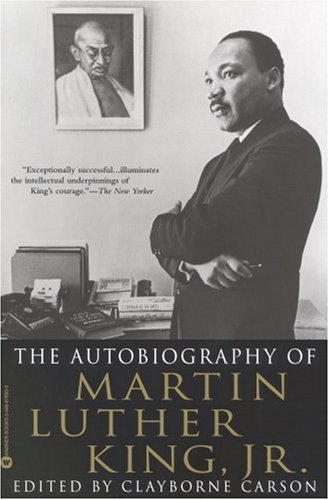
Recently, I listened to The Autobiography of Martin Luther King, Jr. on audiotape. Surprisingly, the audiotape recently won a Grammy. Not surprising because of this piece of work, but I didn't know they offered Grammys to audio tapes.
The book won the Grammy because, constantly inserted throughout it, it has audio clips of soul singing and his speeches. I couldn't believe how many speeches they have on record. They had at least partial footage of the following speeches and other recordings:
Letter from Birmingham Jail
Address to SCLC
On Rosa Parks
The Eulogy of the Child Martyrs
Freedom is Demanded by the Oppressed
On the LA Riots
On High School
Remaining Awake through a Great Revelation
On Black Power
Why Jesus Called a Man a Fool
Unfulfilled Dreams
Nobel Peace Prize Speech
On Vietnam
Rediscovering Lost Values
I've Been to the Mountaintop
I Have a Dream
Why I Must March
The Drum Major Instinct
It was really cool to hear about Martin Luther King Jr. from his own personal accounts. I'm surprised I've never even heard that he has such a book; it's so cool that he was able to record his experiences pretty much up until his death.
I think I enjoyed hearing his speeches the most. He would rise up so much energy from the crowd. People would be responding to every line he said, and sometimes they would be cheering and hollering. To see that one man could cause so much response and so much hope is overpowering. It's a beautiful thing. He's very inspiring, and you can tell his intelligence from his writing and his speeches.

And, he was so bold even after so many threats. I knew that he was threatened, but hearing him talk about the many times that his life (and his family's) would be threatened, it's hard to bear. I am impressed that this didn't stop him on his quest. Actually, he would speak openly about it in his speeches (this probably angered his oppressors). You would think that one might avoid the topic to save oneself, but he was on a mission to make change, and he needed his followers to know that they were not going to bring him, or his mission, down.
I think it is inrcredible that he was offered the Nobel Peace Prize while he was still alive and while so much racism was prevalent in our country. What is really crazy is that, very shortly after he accepted the award, he was thrown in prison. Ironic. He's such a legend but our country throws him in prison. He got his message across and out there, but it just shows how outrageous times were in the south during his lifetime.
Additionally, I think it's honorable that Dr. King decided to dedicate his life to improving conditions in the south. After he graduated college, he was able to accept jobs in the north, where he knew his life would be easier, or in the south, where he knew his life would be harder but he could make more change. King chose the harder path to make more of a difference even though it ultimately lead to his premature death. I would definitely say that is honorable.
King writes all the way back to calling his childhood and pretty much up until the time of his death. They end the audiotape with a recording of him talking about death. He got the message across that he didn't fear death and he was ready to accept it. He had a journey on earth, and he had accomplished very much while he was still alive. He got the ball rolling, and change did happen (even though it is very far from ideal today). If anything, he helped instill hope in his people and he did cause some change in legislation.
What I didn't know and I learned is that King was fascinated and inspired by Gandhi. King took many principles of Gandhi's work and incorporated it into his own. It's pretty obvious that he took his passive resistance method, but I was fascinated to learn that. It makes so much sense!
If anyone is at all interested in King, listening to the audiotape was well worth the time. For History teachers out there, import some of his speeches. He talks about his relationship with Malcolm X, his childhood, the SCLC, and many other famous speeches noted above are quite valuable for the classroom.
So, what do you think of The Autobiography of Martin Luther King, Jr?


No comments:
Post a Comment